Summer 2025
Midwest Roots, A Land-Grant Future
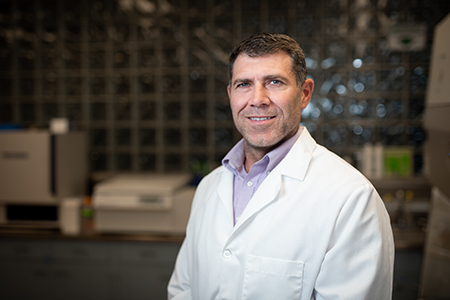 Brad J. Behnke, Dean, College of Health and Human Sciences
Brad J. Behnke, Dean, College of Health and Human Sciences
Many of you do not know me, so let me introduce myself and share a bit of background that has shaped how I envision leading the college during these times. My paternal roots are in western Kansas near Larned—land shaped by dust bowls and defined by community, family, and faith. My paternal grandparents were farmers and ranchers. My grandfather placed his trust—without question—in three people: the local extension agent, the veterinarian, and his minister. On my mother’s side, my roots trace back to the Cherokee Nation in Tahlequah. After serving in the Navy and landing at Normandy on D-Day, my maternal grandfather returned home to Kansas. Together with my grandmother, he built and operated a greenhouse and nursery in Newton. So yes, I have strong Midwest roots—deeply grounded in service, resilience, and a belief in the power of local relationships.
The Contemporary College of Health and Human Sciences: Land-Grant Roots, Modern Reach
A common question from alumni is:
“What happened to Home Economics or Human Ecology at K-State? Do those values still exist in today's programs?”
The answer is a resounding yes—our foundational commitments remain firmly in place, even as names and structures have evolved.
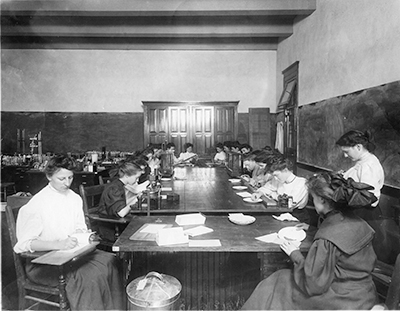 The field traces its origins to the Lake Placid Conferences (1899–1908), which formalized Home Economics as a discipline committed to improving the quality of life for individuals, families, and communities. As stated in the 1902 proceedings:
The field traces its origins to the Lake Placid Conferences (1899–1908), which formalized Home Economics as a discipline committed to improving the quality of life for individuals, families, and communities. As stated in the 1902 proceedings:
“Home economics in its most comprehensive sense is the study of the laws, conditions, principles and ideals which are concerned on one hand with man's immediate physical environment and on the other hand with his nature as a social being, and is the study specially of the relation between those two factors.”
— Lake Placid Conference Proceedings, Vol. 4, 1902
(While “man” was used generically in 1902, it was understood to include women.)
The story of the College of Health and Human Sciences (HHS) at Kansas State University is a direct continuation of that vision. It is a narrative of transformation—of evolving names and structures—but not of abandoning foundational aims. This kind of thoughtful evolution is exactly what any robust and enduring academic system must undergo: adaptive, yet deeply rooted.
A Historical Overview of the College of Health and Human Sciences at Kansas State University: Our Past, Our Present, and Our Future
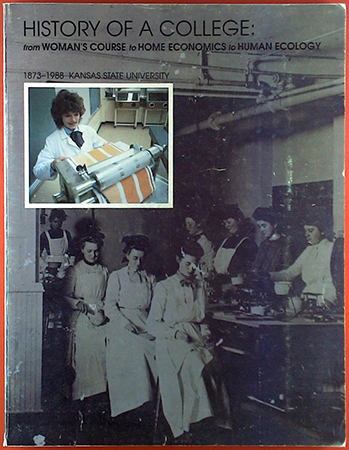 Our college has a rich history that is deeply intertwined with the broader history of our University. The historical roots of HHS are documented in two key texts: History of a College: From Woman’s Course to Home Economics to Human Ecology (1988) by Dean Ruth Hoeflin, and Legacy of Leadership: Human Ecology at Kansas State University (2010) by Dean Carol Kellett, as summarized below.
Our college has a rich history that is deeply intertwined with the broader history of our University. The historical roots of HHS are documented in two key texts: History of a College: From Woman’s Course to Home Economics to Human Ecology (1988) by Dean Ruth Hoeflin, and Legacy of Leadership: Human Ecology at Kansas State University (2010) by Dean Carol Kellett, as summarized below.
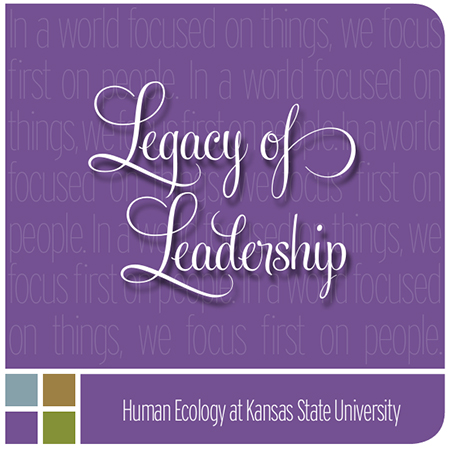 Following this brief review of our history, the events and rationale for our most recent name change, our “Next-Gen” strategic plan, and the current 2022–2025 academic reorganization are outlined. The name change, strategic plan and reorganization are firmly grounded in the college’s identity, with the intent to strengthen its relevance and position it for a sustainable and impactful future.
Following this brief review of our history, the events and rationale for our most recent name change, our “Next-Gen” strategic plan, and the current 2022–2025 academic reorganization are outlined. The name change, strategic plan and reorganization are firmly grounded in the college’s identity, with the intent to strengthen its relevance and position it for a sustainable and impactful future.
New Next-Generation College of Health and Human Sciences Strategic Plan
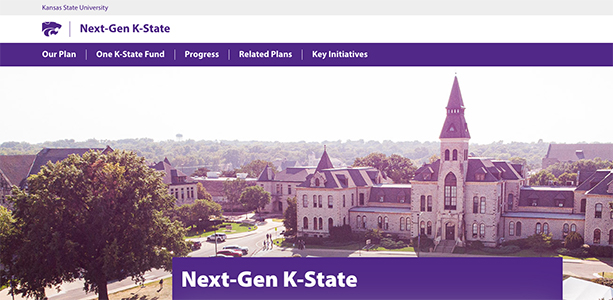 In September 2023, Kansas State University launched a strategic plan that reasserted its identity as a land-grant institution with a next-generation purpose. The goals were ambitious, as they should be. Each college was required to produce a corresponding plan—a roadmap not of convenience, but of conviction. Given their deep understanding of the University and its culture, Emergent Method was once again engaged to assist HHS. The timeline was tight, and the expectations were high. In January 2024, HHS began its journey toward articulating a renewed sense of purpose.
In September 2023, Kansas State University launched a strategic plan that reasserted its identity as a land-grant institution with a next-generation purpose. The goals were ambitious, as they should be. Each college was required to produce a corresponding plan—a roadmap not of convenience, but of conviction. Given their deep understanding of the University and its culture, Emergent Method was once again engaged to assist HHS. The timeline was tight, and the expectations were high. In January 2024, HHS began its journey toward articulating a renewed sense of purpose.
Reflection
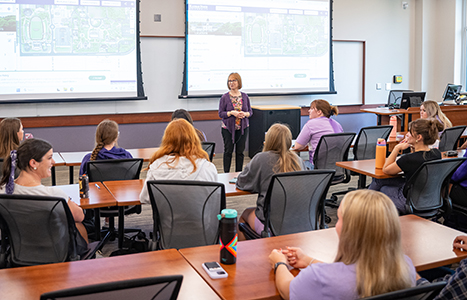 The College of Health and Human Sciences at Kansas State University has never been about simply training students for narrow roles. It has been about something deeper: cultivating competence, fostering responsibility, and embedding knowledge in the lived reality of families, health systems, and economic life. It remains—now and always—a college grounded in the land-grant ethos: that education, to be worthy of the name, must aim not just at success, but at significance.
The College of Health and Human Sciences at Kansas State University has never been about simply training students for narrow roles. It has been about something deeper: cultivating competence, fostering responsibility, and embedding knowledge in the lived reality of families, health systems, and economic life. It remains—now and always—a college grounded in the land-grant ethos: that education, to be worthy of the name, must aim not just at success, but at significance.
References:
- Hoeflin, Ruth. History of a College: From Woman’s Course to Home Economics to Human Ecology (1988).
- Kellett, Carol. Legacy of Leadership: Human Ecology at Kansas State University (2010).
- Lake Placid Conference Proceedings, Volume 4. Washington: American Home Economics Association, 1902.

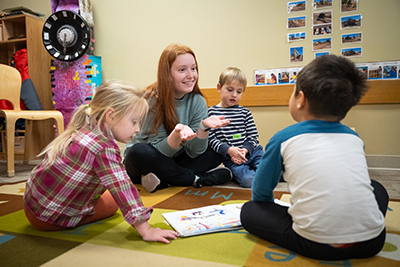 The Human Science domain includes academic programs such as Early Childhood Education; Couple and Family Therapy; Human Development and Family Science; Family and Consumer Sciences Education; Gerontology; Prevention Science; Conflict Resolution; Integrative Human Sciences; and Family and Community Services.
The Human Science domain includes academic programs such as Early Childhood Education; Couple and Family Therapy; Human Development and Family Science; Family and Consumer Sciences Education; Gerontology; Prevention Science; Conflict Resolution; Integrative Human Sciences; and Family and Community Services. The Health Science area encompasses Public Health; Dietetics; Kinesiology; Communication Sciences and Disorders; the Physician Assistant Program; Athletic Training and Rehabilitation Sciences; Integrative Physiology; Sports Nutrition; and Nutrition and Health.
The Health Science area encompasses Public Health; Dietetics; Kinesiology; Communication Sciences and Disorders; the Physician Assistant Program; Athletic Training and Rehabilitation Sciences; Integrative Physiology; Sports Nutrition; and Nutrition and Health. The Economics and Consumer Sciences focus is reflected in our Personal Financial Planning, Fashion Studies, Sustainable Fashion Business, Hospitality Management, Event Management, and Sensory Sciences programs.
The Economics and Consumer Sciences focus is reflected in our Personal Financial Planning, Fashion Studies, Sustainable Fashion Business, Hospitality Management, Event Management, and Sensory Sciences programs.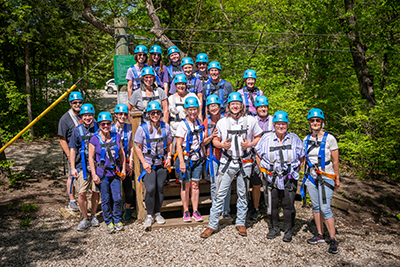 Our
Our 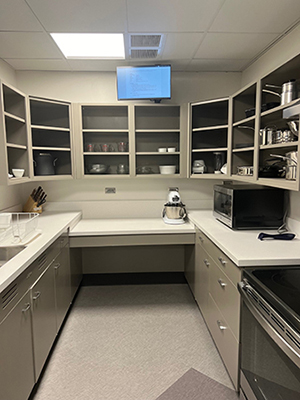 Our physical spaces have also been upgraded to reflect the strength of our academic offerings. Although we lost the use of the Natatorium, gymnasium, and Stone House due to deterioration, recent enhancements to our spaces include the modernization of instructional kitchens in Justin Hall, updated fashion design labs and sewing facilities, and applied learning spaces in Lafene Hall to support our
Our physical spaces have also been upgraded to reflect the strength of our academic offerings. Although we lost the use of the Natatorium, gymnasium, and Stone House due to deterioration, recent enhancements to our spaces include the modernization of instructional kitchens in Justin Hall, updated fashion design labs and sewing facilities, and applied learning spaces in Lafene Hall to support our 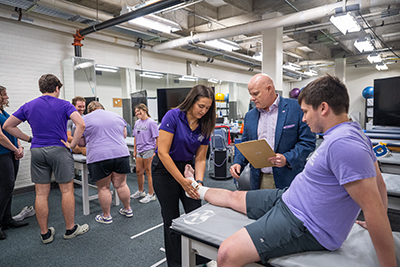 athletic training program. Ice Hall has undergone extensive renovations to accommodate our growing Physician Assistant studies program and to expand research laboratory space. Additionally, in collaboration with Dean Debbie Mercer from the College of Education in Bluemont Hall, we have initiated landscaping projects that promote mental health and wellness by leveraging the restorative benefits of nature.
athletic training program. Ice Hall has undergone extensive renovations to accommodate our growing Physician Assistant studies program and to expand research laboratory space. Additionally, in collaboration with Dean Debbie Mercer from the College of Education in Bluemont Hall, we have initiated landscaping projects that promote mental health and wellness by leveraging the restorative benefits of nature. 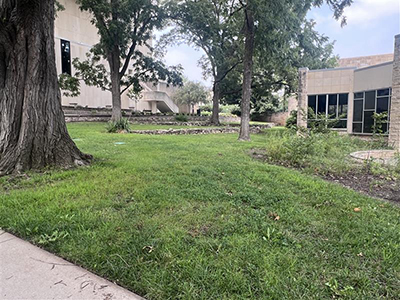
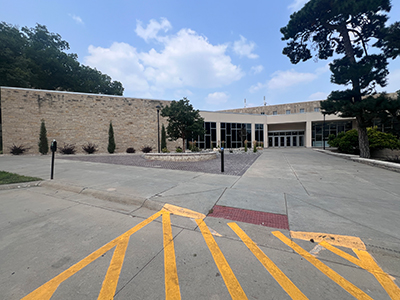
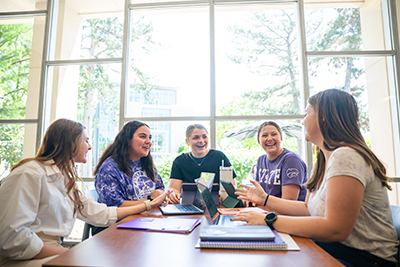 In short, we have not left behind Home Economics, Domestic Sciences, or Human Ecology—looking ahead, we have evolved them to meet contemporary needs while honoring their enduring principles. Future directions include the development of mobile classrooms and clinics that bring expertise directly into communities, a Rural Faculty Fellows program to embed faculty in Kansas communities and expanded statewide partnerships and academic pipelines in high-demand fields of health, education, consumer and human services.
In short, we have not left behind Home Economics, Domestic Sciences, or Human Ecology—looking ahead, we have evolved them to meet contemporary needs while honoring their enduring principles. Future directions include the development of mobile classrooms and clinics that bring expertise directly into communities, a Rural Faculty Fellows program to embed faculty in Kansas communities and expanded statewide partnerships and academic pipelines in high-demand fields of health, education, consumer and human services.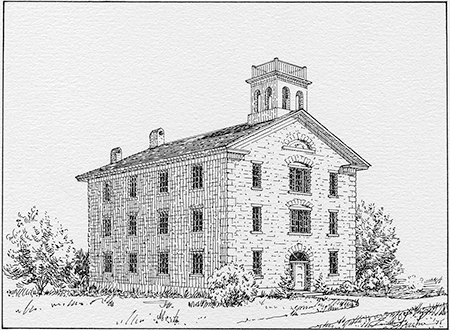 In 1873, John Anderson was appointed President of Kansas State Agricultural College (KSAC). Under his leadership, the foundation for what is now the College of Health and Human Sciences began with the introduction of a “Women’s Course.” At a time when most institutions excluded women entirely, Kansas State established a six-year program specifically for women, focused on the stewardship of family life, health, and economic responsibility. KSAC offered three such courses: the Farmers Course, the Women’s Course, and the Mechanics Course. The Women’s Course emphasized family health, moral instruction, and practical skills, with subjects such as domestic economy, industrial drawing, bookkeeping, and a strong focus on nutrition, hygiene, and sanitation. Collectively, these programs reflected a guiding philosophy: that human development is not isolated from daily life, but deeply embedded within it.
In 1873, John Anderson was appointed President of Kansas State Agricultural College (KSAC). Under his leadership, the foundation for what is now the College of Health and Human Sciences began with the introduction of a “Women’s Course.” At a time when most institutions excluded women entirely, Kansas State established a six-year program specifically for women, focused on the stewardship of family life, health, and economic responsibility. KSAC offered three such courses: the Farmers Course, the Women’s Course, and the Mechanics Course. The Women’s Course emphasized family health, moral instruction, and practical skills, with subjects such as domestic economy, industrial drawing, bookkeeping, and a strong focus on nutrition, hygiene, and sanitation. Collectively, these programs reflected a guiding philosophy: that human development is not isolated from daily life, but deeply embedded within it.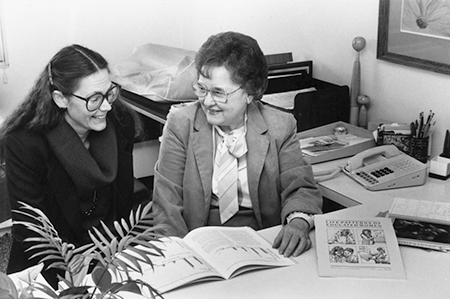 As times have changed, we have changed. These developments are chronicled in History of a College: From Woman’s Course to Home Economics to Human Ecology (1988) by former Dean Ruth Hoeflin, which documents more than 150 milestones and changes between 1872 and 1988. We are currently working to update this record with the assistance of alumni, as well as current and retired faculty and administrators.
As times have changed, we have changed. These developments are chronicled in History of a College: From Woman’s Course to Home Economics to Human Ecology (1988) by former Dean Ruth Hoeflin, which documents more than 150 milestones and changes between 1872 and 1988. We are currently working to update this record with the assistance of alumni, as well as current and retired faculty and administrators.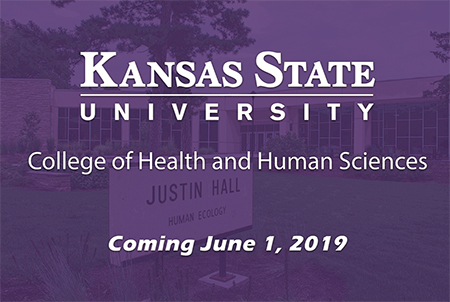 And, in July 2018, the faculty- and staff voted—81.8% were in favor of change our name to Health & Human Sciences—a landslide in academic terms. The College Alumni Board and all three living former deans—Barbara Stowe, Carol Kellett, and Virginia Moxley—endorsed the change without reservation.
And, in July 2018, the faculty- and staff voted—81.8% were in favor of change our name to Health & Human Sciences—a landslide in academic terms. The College Alumni Board and all three living former deans—Barbara Stowe, Carol Kellett, and Virginia Moxley—endorsed the change without reservation.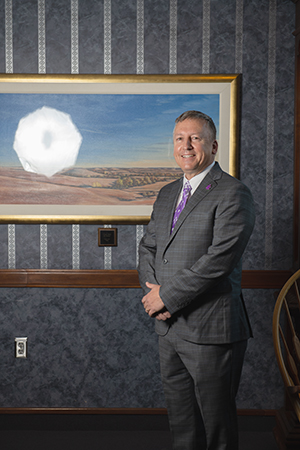 On February 4, 2022, K-State appointed a new president, Richard Linton, who brought fresh vision and energy to the university. He challenged each college to become a leader of change in order to meet the evolving demands of higher education. At the same time, the leadership of the College recognized that while the name had changed, the underlying organizational structures had not. Silos remained. Interdisciplinary collaboration was more an aspiration than a reality; it was time to do something different. A survey of faculty and staff was conducted and reorganizing academic units emerged as a top priority.
On February 4, 2022, K-State appointed a new president, Richard Linton, who brought fresh vision and energy to the university. He challenged each college to become a leader of change in order to meet the evolving demands of higher education. At the same time, the leadership of the College recognized that while the name had changed, the underlying organizational structures had not. Silos remained. Interdisciplinary collaboration was more an aspiration than a reality; it was time to do something different. A survey of faculty and staff was conducted and reorganizing academic units emerged as a top priority. 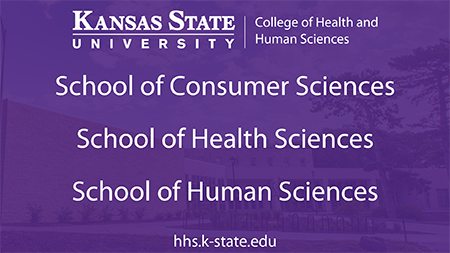 This reorganization aimed to reduce silos, enhance interdisciplinary collaboration, and better align with the college’s land-grant mission. It promotes financial efficiency by reducing administrative appointments and improves communication and decision-making. The logic was simple but profound: align the college’s internal order with the complexity of the world it seeks to address. That’s how you prepare students—not just to get jobs, but to take responsibility, to lead, and to build resilient communities.
This reorganization aimed to reduce silos, enhance interdisciplinary collaboration, and better align with the college’s land-grant mission. It promotes financial efficiency by reducing administrative appointments and improves communication and decision-making. The logic was simple but profound: align the college’s internal order with the complexity of the world it seeks to address. That’s how you prepare students—not just to get jobs, but to take responsibility, to lead, and to build resilient communities.